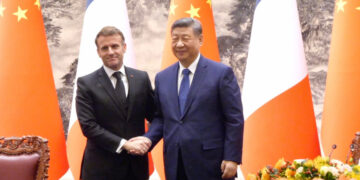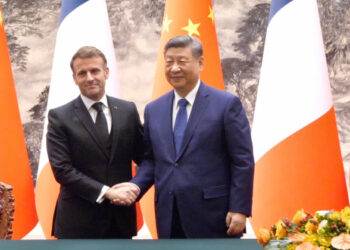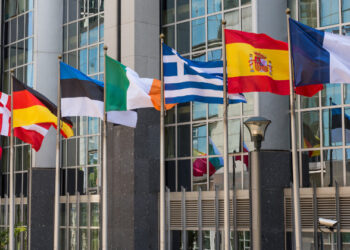The new right-leaning European Parliament has the potential to undermine climate action. But what if mayors led the Parliament? Drawing on an analysis of the political affiliation and policy priorities of nearly 100 European mayors, Catarina Heeckt, Pietro Reviglio and Milena Larue show that this would be a very different story. At city level, climate action remains a unifying agenda that transcends political differences.
The 2024 European Parliament elections resulted in a clear turn to the right. While the centre-right European People’s Party (EPP) remains the largest bloc, Eurosceptic, populist and far-right parties have made significant gains, particularly in countries such as France, Italy, Germany and Belgium.
Figure 1: Map of the composition of the European Parliament (2019 and 2014)
Source: European Parliament
Although it is too early to say how this new balance of power will shape EU policy, there is a growing consensus that we may witness a de-prioritisation of the most ambitious elements of the EU’s climate agenda. Or, worse, a rollback on key milestones such as the 2035 combustion engine ban.
The initial debates in the new European Parliament, particularly in the context of Ursula von der Leyen’s re-election bid, have confirmed that the European Green Deal has become a contentious and identity-politics driven issue. The disagreements now extend beyond the EU’s emissions reduction targets to the tools, speed and strategies required to meet the bloc’s climate objectives.
Are Europe’s cities bucking the trend?
Compared to their relatively more conservative national contexts, Europe’s cities have long been seen as more open to progressive political and climate agendas. To test this hypothesis, we have looked into the responses to the Eurocities Pulse Mayors Survey 2024, which unpicks the policy priorities of nearly 100 mayors across Europe, and linked these to the political affiliations of these mayors.
Our analysis shows that if mayors ruled the European Parliament, we would likely see cross-party support for the European Green Deal, given Europe’s centre-right mayors, which make up more than one third of the mayors surveyed, also strongly support climate objectives. This is not the case in the current make-up of the European Parliament, where climate action is a partisan issue and more politically right-leaning parties are strongly opposed to key elements of the Green Deal.
What are the key differences between the composition of the European Parliament and Eurocities mayors?
Although the rising influence of far-right parties in urban politics should not be underestimated, our data shows that Europe’s largest cities continue to be led by moderate, centrist forces, with little room for extremes. Compared to the composition of the European Parliament, the cities in our sample are almost exclusively governed by mayors from the centre-right (EPP 37%) and centre-left (Socialists and Democrats – S&D 37%).
Figure 2: If mayors ruled the European Parliament
Source: Eurocities research
Our analysis of mayoral priorities reveals that urban leaders are united in their commitment to climate action, regardless of political affiliation. According to data from the Eurocities Pulse Mayors Survey, 68% of mayors aligned with the centre-right EPP, and 68% of mayors aligned with the centre-left S&D, rank climate action as one of their top three policy priorities.
Figure 3: Percentage of mayors that view climate action as a top priority
Source: Eurocities research
These results suggest that cities are managing to rise above partisan divisions, with climate policy emerging as a unifying agenda – in marked contrast to the climate debate at national or EU levels. While politicians working at other levels of government may find that climate action is leading to divisions in society that make it politically contentious, city leaders likely have more widespread buy-in from urban residents. This is allowing them to make a clear case for how long-term ambitions translate into concrete solutions for urban environments.
Indeed, the survey responses suggest that climate action is not just an abstract concept for mayors of Europe’s larger cities but rather a clear objective with multiple co-benefits for improving urban quality of life. For instance, the shift to decarbonising transport and promoting sustainable mobility, or implementing policies to improve energy efficiency in buildings, bring tangible benefits to city residents beyond reducing carbon emissions.
Similarly, climate adaptation policies, such as increasing green space, managing water flows and enhancing urban biodiversity, directly improve living conditions in cities. While the interpretation of what “climate action” really means and the concrete policy foci may vary between cities, it remains a top priority across the political spectrum.
What do mayors expect from the new EU leadership?
As the EU and national governments become increasingly divided on climate action, there is a clear opportunity for city leaders to work as brokers of political consensus. Their pragmatic, bipartisan support for climate action, along with their implementation of policies that have multiple positive effects on citizens’ well-being and urban economies, can contribute to a more informed debate.
What is also clear is that cities cannot tackle climate change alone. Strong coordination between the EU, national governments and city leaders is essential. Interestingly, close to 50% of EU mayors feel that EU institutions and policies tend not to take their specific needs into account, or fully appreciate the potential that cities offer. It is therefore not surprising that mayors across the political spectrum identified the need to improve the way the EU and cities work together among their top three priorities for the next European Commission.
Our data also shows that mayors want the European Commission to provide more support in implementing the European Green Deal at the local level, including additional resources and capacity building to help them meet their climate commitments. Nearly half (49%) of respondents indicated that they lack sufficient tools and administrative capacity to meet their climate targets.
Among the top priorities for EU support, mayors highlighted the need for increased investment in sustainable mobility, closer cooperation with the EU to deliver urban transitions and the establishment of a robust Social Climate Fund. Given this complex background, the debate on the future of the EU budget and its support for climate investments will be a crucial political battle.
What role for cities in driving forward the EU’s climate agenda?
The good news is that cities have already played a pivotal role in EU climate diplomacy during the previous mandate. And they can do it again. A recent example is cities’ key role in pushing for an ambitious EU Nature Restoration Law. Beyond joint lobbying through networks like Eurocities, many cities also exerted pressure at the national level. For example, the Brussels Regional Minister, Alain Maron, played a crucial role on behalf of the Belgian EU Presidency in facilitating negotiations among national governments.
Looking ahead, cities must continue promoting their vision through strong cooperation with the European Parliament, which tends to view city leaders as essential partners in developing new legislation. The composition of the new Parliament is particularly significant in that regard, given that nearly a third of newly elected MEPs have a background in local politics.
For example, among the 76 MEPs in the Italian delegation, 50% (38 MEPs) have experience in city government, with 23% (17 MEPs) having served as mayors. While this is a somewhat special case, Eurocities research suggests that many former city leaders are now MEPs, offering opportunities to forge alliances with urban champions that will strengthen EU climate policy.
Ursula von der Leyen’s recently unveiled political guidelines for her new mandate, along with the composition of her European Commission, also reflect continuity with her flagship European Green Deal – although with a stronger focus on implementation through new alliances and support for industry.
Despite some setbacks during the EU election campaign, climate action remains a key issue on the EU’s agenda. Mayors will continue to play a critical role in ensuring that bold objectives and legislation are translated into effective action across the continent.
This article is based on an analysis of the political affiliation and policy priorities of nearly 100 European mayors carried out by Eurocities and LSE Cities.
Note: This article gives the views of the authors, not the position of EUROPP – European Politics and Policy or the London School of Economics. Featured image credit: Hadrian / Shutterstock.com















































Discussion about this post